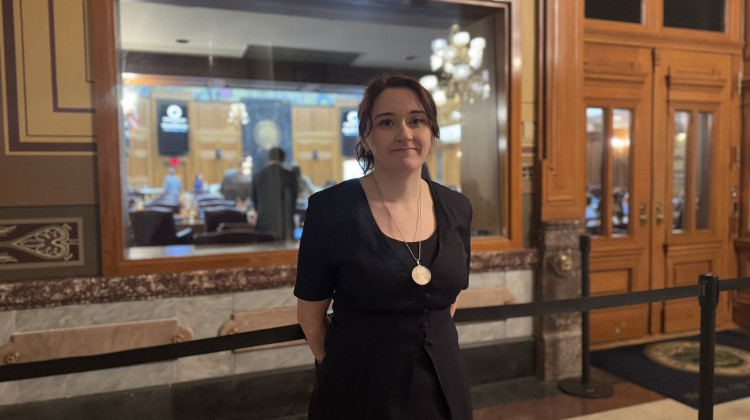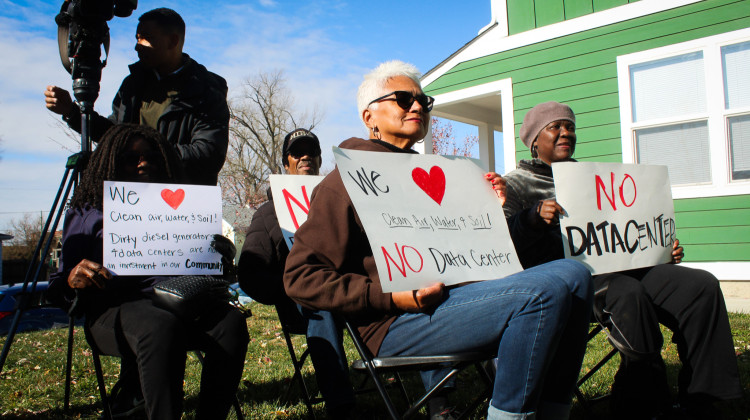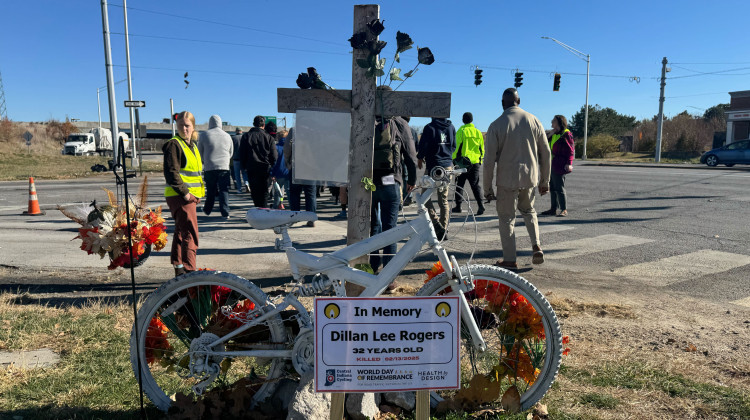
Fort Wayne resident Sarah Conrad said she wouldn’t have escaped homelessness if she didn’t have help from her community.
Elizabeth Gabriel / WFYIA new House bill in Indiana would make it illegal for people who are homeless to sleep outside.
Indiana House Representatives amended House Bill 1662 on Monday striking a provision that aimed to prevent homeless advocacy organizations from using state funds to pay for permanent housing.
If HB 1662 is approved as is, anyone who has lived on the street for at least 24 hours could receive a Class C misdemeanor if they are caught using land owned by the state or a political subdivision for camping, sleeping, or living in long term shelters.
According to Indiana law, a Class C misdemeanor can result in a jail sentence of up to 60 days and a fine of up to $500. Furthermore, the bill would prevent city and county governments from overriding the legislation if it’s approved.
A similar bill introduced last year failed after first reading.
Homelessness continues to be a hot button issue in Indiana and across the country. In 2023, Indiana saw a 10% increase in homelessness from the previous year, according to the Indiana University Public Policy Institute. The institute suggests addressing homelessness by creating additional housing, addressing racial disparities in housing access and decriminalizing homelessness.
The proposed legislation does none of those things, housing advocates say. They are concerned the bill could perpetuate the cycle of homelessness even more.
Fort Wayne resident Sarah Conrad couch surfed and lived in her car as a teenager. She’s gotten back on her feet and even purchased a home last year. But she’s concerned about people’s ability to gain employment and find housing if they have a Class C misdemeanor.
“In 2015, I lived in a 1996 Ford Taurus where I was constantly harassed by police and threatened with tickets,” Conrad said after the hearing. “I never once understood how this [was] going to stop me from being homeless. Policies and actions targeting homeless individuals only worsen the crisis.”
HB 1662 is backed by Cicero Action, the political action committee for the Cicero Institute, a Texas-based public policy organization that has supported the implementation of harsh penalties against people experiencing homelessness.
States that have passed homelessness bans endorsed by Cicero Action include Missouri, Kentucky, Tennessee, Texas, Utah and Florida. Oklahoma is also considering Cicero-backed legislation that could further cripple efforts to end homelessness.
"This bill created two things –– pressure for these folks to move inside and off the street, and a last resort to save lives,” said Devon Kurtz, the head of research and policy development on homelessness and public safety at the Cicero Institute, during testimony on Monday.
Krutz said that Indiana, and the U.S. as a whole, “is not experiencing a homelessness crisis as much as it’s experiencing an unsheltered humanitarian disaster,” adding that more must be done to help people living on the streets.
But advocates like Chelsea Haring-Cozzi, executive director of Coalition for Homelessness Intervention and Prevention, said putting people in jail doesn’t connect them with housing or other services, and only puts up more barriers.
“You’re already fining somebody who’s in an extremely vulnerable position who’s not going to be able to pay that fine,” Haring-Cozzi said. “If the fine gets paid, likely it’s going to be paid by a nonprofit partner. And that takes funding away from the actual services and housing solutions we need to be investing in.”
Nationally, research shows that permanently housing someone saves taxpayers more than putting someone in jail. For example, New York City spends $556,539 annually to jail people, while it only costs $42,000 to move someone into supportive housing, according to the Vera Institute of Justice, an organization working to improve the criminal justice system.
Data also shows that some states with laws that were lobbied by Cicero Action haven’t completely improved community safety or addressed homelessness. Officers with the Marietta Police Department in Georgia spent roughly half of their time addressing issues related to homelessness, according to an audit by the Georgia Department of Audits and Accounts.
HB 1662, authored by Rep. Michelle Davis (R-Whiteland), originally sought to prevent organizations from using state funds to pay for long-term housing. The bill would only allow state funds to pay for things like substance use and mental health treatment and short term housing.
Reverend Forrest Gilmore, the executive director of the homelessness services and housing provider Beacon Inc., said his organization has provided permanent housing to hundreds of homeless people each year for decades.
Gilmore added that if the bill attacks federal funding that’s disbursed through the state, it would impact at least 60% of his organization’s budget.
“If the federal funding were eliminated, it would wipe out our housing program,” Gilmore said. “We would go back to just [providing] emergency services and wouldn't have those housing options for people.”
The bill was amended on Monday by the Committee on Government and Regulatory Reform to remove wording related to funding. But advocates are concerned lawmakers could add that language back to the bill or another piece of legislation, before the end of the session.
Many advocates for people who are unhoused didn’t think HB 1662 would receive traction this year. But this proposed legislation is part of a nationwide effort to crack down on people who are experiencing homelessness.
“The purpose of this policy [is to move people off the street and into shelter], not to decrease homelessness overall. That takes a lot more than just this," Kurtz said.
Indiana HB 1662 is still in the Committee on Government and Regulatory Reform.
Contact WFYI’s health reporter Elizabeth Gabriel at egabriel@wfyi.org
 DONATE
DONATE






 Support WFYI. We can't do it without you.
Support WFYI. We can't do it without you.